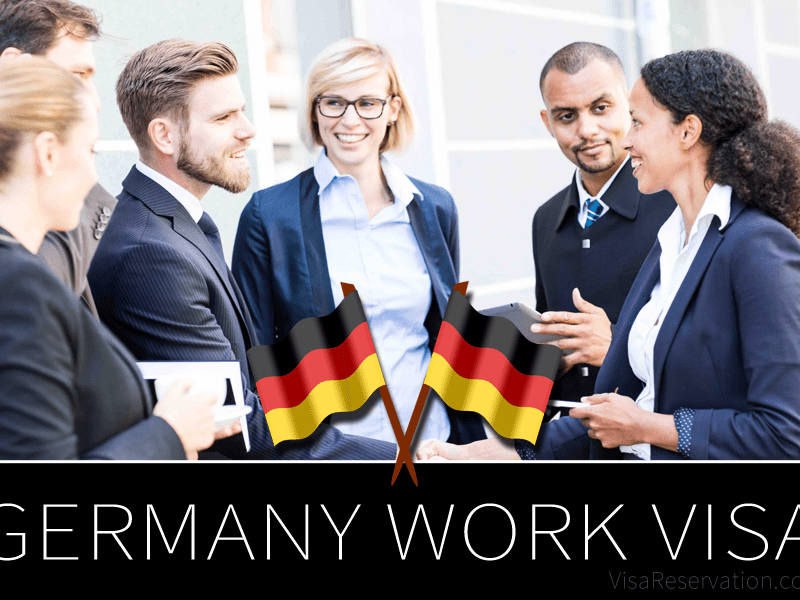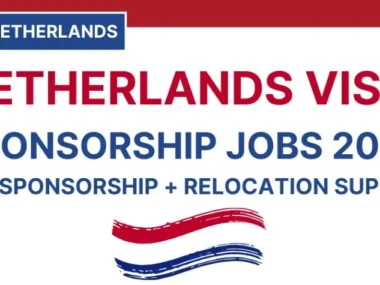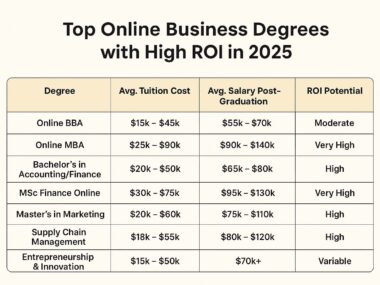If you’re looking for new opportunities abroad, Germany has opened its doors wide for foreign workers through the “Germany Free Work Visa” program for 2024. While countries like the UK and US have tightened their immigration policies, Germany is actively welcoming skilled workers to fill its labor shortages. This program provides an excellent chance for you to relocate and start a new life in one of Europe’s most developed nations. Whether you’re a skilled tradesperson or an experienced professional, this could be the perfect opportunity for you.
In this article, we’ll break down everything you need to know about the Germany Free Work Visa 2024, the requirements, how to apply, and tips to ensure a smooth relocation process. Read on to discover how you can take advantage of this golden opportunity.
Why Germany is Offering Free Work Visas
Germany is facing a severe labor shortage, particularly in sectors like healthcare, engineering, construction, and skilled trades. To combat this, the German government has introduced several initiatives to attract foreign workers, and one of the most exciting opportunities is the free work visa program.
This visa allows individuals to enter the country, work for up to three years, and even apply for permanent residency afterward. Whether you’re a plumber, electrician, mechanic, or have another type of skill, Germany is keen to have you join its workforce. This initiative is designed not only to fill job vacancies but also to bring in new talent to strengthen the economy.
Who Can Apply for the Germany Free Work Visa?
One of the best parts of the Germany Free Work Visa is that you do not need to be a university graduate to apply. The program is open to anyone with at least two years of work experience and a recognized certificate in a skilled trade. Professions like electricians, mechanics, plumbers, and other skilled jobs are in high demand, and Germany is eager to recruit people with these abilities.
To apply, you must meet certain basic qualifications:
- Work experience: You need at least two years of experience in your profession.
- Certification: You must have a certificate that proves your skills in your trade. This can be a vocational training certificate or a recognized qualification.
- Language skills: Although it’s not always required, having some knowledge of German will give you an advantage when applying. In some cases, proficiency in English may be enough, depending on the employer.
The Germany Opportunity Card and Its Point System
The Germany Opportunity Card is another key component of this process. This card operates on a points-based system, and you need to score at least six points to qualify for a work visa. Points are awarded based on your qualifications, work experience, language skills, and other factors.
Here’s a breakdown of how you can earn points:
- Educational qualifications: Vocational training or a university degree can help you earn points.
- Work experience: Having two years of work experience in your field is required.
- Age: Being in a certain age bracket, usually between 18 and 45, will earn you points.
- Language skills: Proficiency in German or English will increase your score.
- Ties to Germany: If you have family or a spouse working in Germany or you’ve lived in the country before, you can earn additional points.
To apply for the Opportunity Card, you’ll need to visit the official portal when it opens on June 1, 2024. The portal will allow you to calculate your points based on the criteria listed above. If you meet the minimum score of six points, you can proceed with the visa application process.
How to Apply for the Germany Free Work Visa
Now that you know the basics, let’s dive into the application process. Here’s a step-by-step guide:
Step 1: Calculate Your Points
As mentioned earlier, the first step is to calculate your points on the Germany Opportunity Card portal. The portal will ask you a series of questions about your qualifications, work experience, and language proficiency. Some of the questions include:
- Have you completed vocational training or earned a university degree?
- How many years of experience do you have in your profession?
- Which country do you currently reside in?
- How proficient are you in German or English?
- Have you lived in Germany before?
- Do you have a spouse or family member in Germany?
Answering these questions truthfully will give you a clear picture of whether you meet the six-point requirement. Once you complete the questionnaire, you’ll receive an email with your score.
Step 2: Verify Your Certification
Once you’ve met the point requirement, you need to ensure that your professional certificates are recognized in Germany. This is a crucial step, as your work visa application could be denied if your qualifications aren’t recognized.
To get your certificate verified, visit the Anabin website, where you can submit your qualifications for evaluation. Anabin helps foreign workers ensure their certificates meet German standards. Once verified, your qualifications will be recognized by employers across Germany, allowing you to apply for jobs confidently.
Step 3: Search for Jobs in Germany
With your points calculated and certificates verified, the next step is to search for jobs in Germany. There are numerous online platforms where you can find job listings, such as Job World and other popular job search engines. Simply type in your profession (e.g., electrician, mechanic, plumber) and browse through the available positions.
Make sure to check the job requirements thoroughly before applying. Employers often list the necessary qualifications, such as vocational training, technical skills, or language proficiency. Once you find a suitable job, apply using your verified certificate and CV.
Top Job Sectors in Germany for Foreign Workers
While skilled trades like mechanics, electricians, and plumbers are in high demand, Germany is also looking for workers in other fields. Below are some of the top sectors with job openings for foreign workers:
- Healthcare: Nurses, caregivers, and medical technicians are needed due to an aging population and labor shortages.
- Engineering: Mechanical, electrical, and civil engineers are in high demand across various industries.
- IT and Software Development: Germany’s tech industry is rapidly growing, and there’s a high demand for software developers, data scientists, and IT specialists.
- Construction: The construction sector is booming, and jobs for carpenters, builders, and construction workers are readily available.
- Hospitality: Chefs, hotel staff, and restaurant workers are needed in Germany’s thriving tourism sector.
Benefits of Working in Germany
Germany is known for offering excellent working conditions, fair wages, and strong worker protections. Here are some of the key benefits of working in Germany:
- Competitive salaries: Depending on your field, you can earn a good salary with the potential for raises and bonuses.
- Work-life balance: Germany is known for its emphasis on work-life balance, with reasonable working hours and paid vacation time.
- Healthcare: Germany has one of the best healthcare systems in the world, and as an employee, you’ll be entitled to comprehensive health coverage.
- Permanent residency: After working for three years, you may be eligible for permanent residency, allowing you to settle in Germany long-term.
What to Expect After Relocating to Germany
Once you’ve secured your job and arrived in Germany, there are a few things you need to do to settle in:
- Register your address: Within two weeks of moving, you’ll need to register your address at the local registration office.
- Open a bank account: You’ll need a German bank account to receive your salary and manage your finances.
- Health insurance: Enroll in the country’s public healthcare system or choose private insurance if you prefer.
- Learn the language: While you may not need German for your job initially, learning the language will help you integrate into society and improve your career prospects.
Conclusion
The Germany Free Work Visa 2024 offers an exciting opportunity for skilled workers worldwide to relocate to Germany and build a successful career. With labor shortages in various sectors, now is the perfect time to apply and take advantage of this visa program. Whether you’re a tradesperson or a professional, the pathway to working in Germany is more accessible than ever before.
By following the steps outlined in this guide—calculating your points, verifying your certificates, and applying for jobs—you’ll be well on your way to securing a job in Germany. Once there, you can enjoy the benefits of living in one of Europe’s most developed countries, with the possibility of gaining permanent residency in the future.
Start preparing now, and make sure to visit the Germany Opportunity Card portal when it opens in June 2024. With the right qualifications and experience, Germany could soon become your new home!




